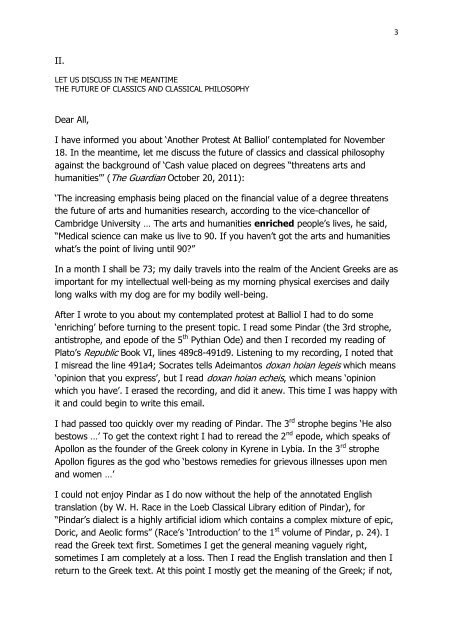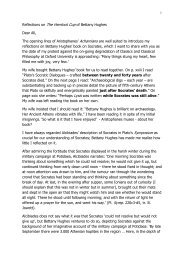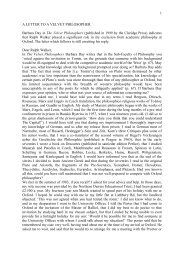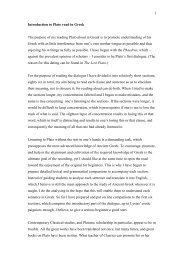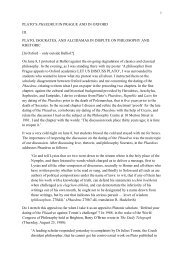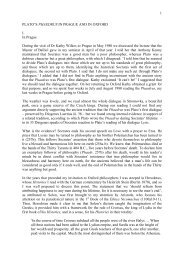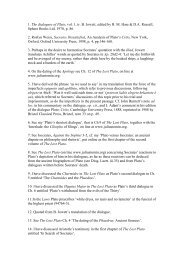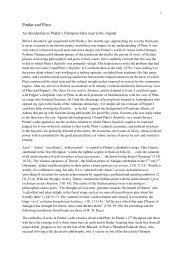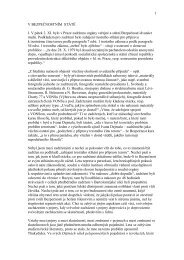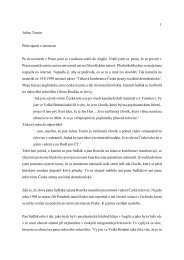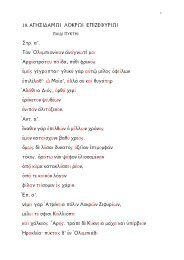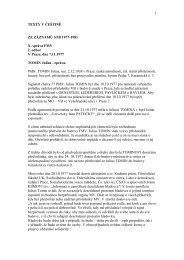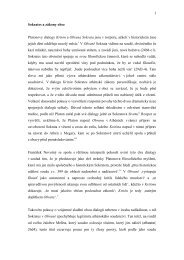ANOTHER PROTEST AT BALLIOL? I. Dear All, Allow ... - Julius Tomin
ANOTHER PROTEST AT BALLIOL? I. Dear All, Allow ... - Julius Tomin
ANOTHER PROTEST AT BALLIOL? I. Dear All, Allow ... - Julius Tomin
You also want an ePaper? Increase the reach of your titles
YUMPU automatically turns print PDFs into web optimized ePapers that Google loves.
3<br />
II.<br />
LET US DISCUSS IN THE MEANTIME<br />
THE FUTURE OF CLASSICS AND CLASSICAL PHILOSOPHY<br />
<strong>Dear</strong> <strong>All</strong>,<br />
I have informed you about „Another Protest At Balliol‟ contemplated for November<br />
18. In the meantime, let me discuss the future of classics and classical philosophy<br />
against the background of „Cash value placed on degrees “threatens arts and<br />
humanities”‟ (The Guardian October 20, 2011):<br />
„The increasing emphasis being placed on the financial value of a degree threatens<br />
the future of arts and humanities research, according to the vice-chancellor of<br />
Cambridge University … The arts and humanities enriched people‟s lives, he said,<br />
“Medical science can make us live to 90. If you haven‟t got the arts and humanities<br />
what‟s the point of living until 90?”<br />
In a month I shall be 73; my daily travels into the realm of the Ancient Greeks are as<br />
important for my intellectual well-being as my morning physical exercises and daily<br />
long walks with my dog are for my bodily well-being.<br />
After I wrote to you about my contemplated protest at Balliol I had to do some<br />
„enriching‟ before turning to the present topic. I read some Pindar (the 3rd strophe,<br />
antistrophe, and epode of the 5 th Pythian Ode) and then I recorded my reading of<br />
Plato‟s Republic Book VI, lines 489c8-491d9. Listening to my recording, I noted that<br />
I misread the line 491a4; Socrates tells Adeimantos doxan hoian legeis which means<br />
„opinion that you express‟, but I read doxan hoian echeis, which means „opinion<br />
which you have‟. I erased the recording, and did it anew. This time I was happy with<br />
it and could begin to write this email.<br />
I had passed too quickly over my reading of Pindar. The 3 rd strophe begins „He also<br />
bestows …‟ To get the context right I had to reread the 2 nd epode, which speaks of<br />
Apollon as the founder of the Greek colony in Kyrene in Lybia. In the 3 rd strophe<br />
Apollon figures as the god who „bestows remedies for grievous illnesses upon men<br />
and women …‟<br />
I could not enjoy Pindar as I do now without the help of the annotated English<br />
translation (by W. H. Race in the Loeb Classical Library edition of Pindar), for<br />
“Pindar‟s dialect is a highly artificial idiom which contains a complex mixture of epic,<br />
Doric, and Aeolic forms” (Race‟s „Introduction‟ to the 1 st volume of Pindar, p. 24). I<br />
read the Greek text first. Sometimes I get the general meaning vaguely right,<br />
sometimes I am completely at a loss. Then I read the English translation and then I<br />
return to the Greek text. At this point I mostly get the meaning of the Greek; if not,


